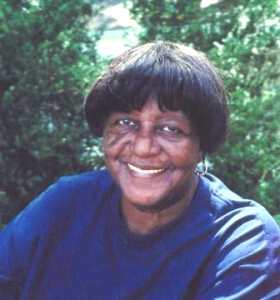Agnes Kane Callum
Distinguished genealogist on Maryland African American history, her vision created the Sotterley Descendants Program.
1926 – 2015

Agnes Kane Callum was born in 1926 in Baltimore, Maryland. She dropped out of high school to marry. But education was always important to Callum, who decided to take the high school equivalency test in 1962. Mrs. Callum enrolled at Morgan State University in 1968 at the age of 46. While at Morgan State University, Mrs. Callum wrote a paper on the acquisition of land by free blacks in St. Mary’s County. After completing her bachelor’s degree at Morgan State University in 1973, and a master’s there in 1975, she became a Fulbright-Hayes Fellow at the University of Ghana.
By 1979, Agnes Kane Callum published her first book which was based on the research she conducted on the genealogy of her own family. It was through her research that Agnes discovered that her paternal grandfather, Henry Kane, had been enslaved at Sotterley Plantation in St. Mary’s County in 1860. For her research work, she used primary sources such as wills from St. Mary’s County. As a result of her work, Callum indexed the entire volume of a St. Mary’s County slave statistics book at the Maryland State Archives, making it more usable to others looking for their roots in Maryland.
Agnes Kane Callum later joined the board of trustees at Sotterley Plantation in the 1990’s, when, by that point, Sotterley was a historic site open to the public. Callum’s historical research of enslaved people at the Sotterley Plantation is credited with helping save the historic site from ruin. She raised $30,000 to ensure the sole remaining slave cabin (dating to the 1830s) was preserved. Her research was instrumental in the development of Historic Sotterley’s “Slavery to Freedom” educational program and site interpretation. Today, Sotterley is a National Historic Landmark
Agnes also played a significant role in the establishment of Historic Sotterley’s Descendants Community through the Descendants Initiative and the Common Ground programs. In addition, she conducted research on the Historic St. Francis Xavier Church in Baltimore and was a founding member of the Baltimore Afro-American Historical Genealogic Society.
Aside from conducting historical research and genealogical work, Agnes Kane Callum contributed to the publication The Catholic Review, as a columnist, using her expertise to focus on African American history in colonial Maryland. She wrote over twenty-five books during her career. Callum later received an honorary degree in history from St. Mary’s College of Maryland. Aside from her work, Agnes Kane Callum was a mother of five. She died in 2015, renowned as an esteemed historian on the topic of African American history and genealogy in Maryland.
Additional resources
https://msa.maryland.gov/megafile/msa/speccol/sc3500/sc3520/013100/013117/html/13117bio.html https://msa.maryland.gov/msa/educ/exhibits/womenshallfame/html/callum.html